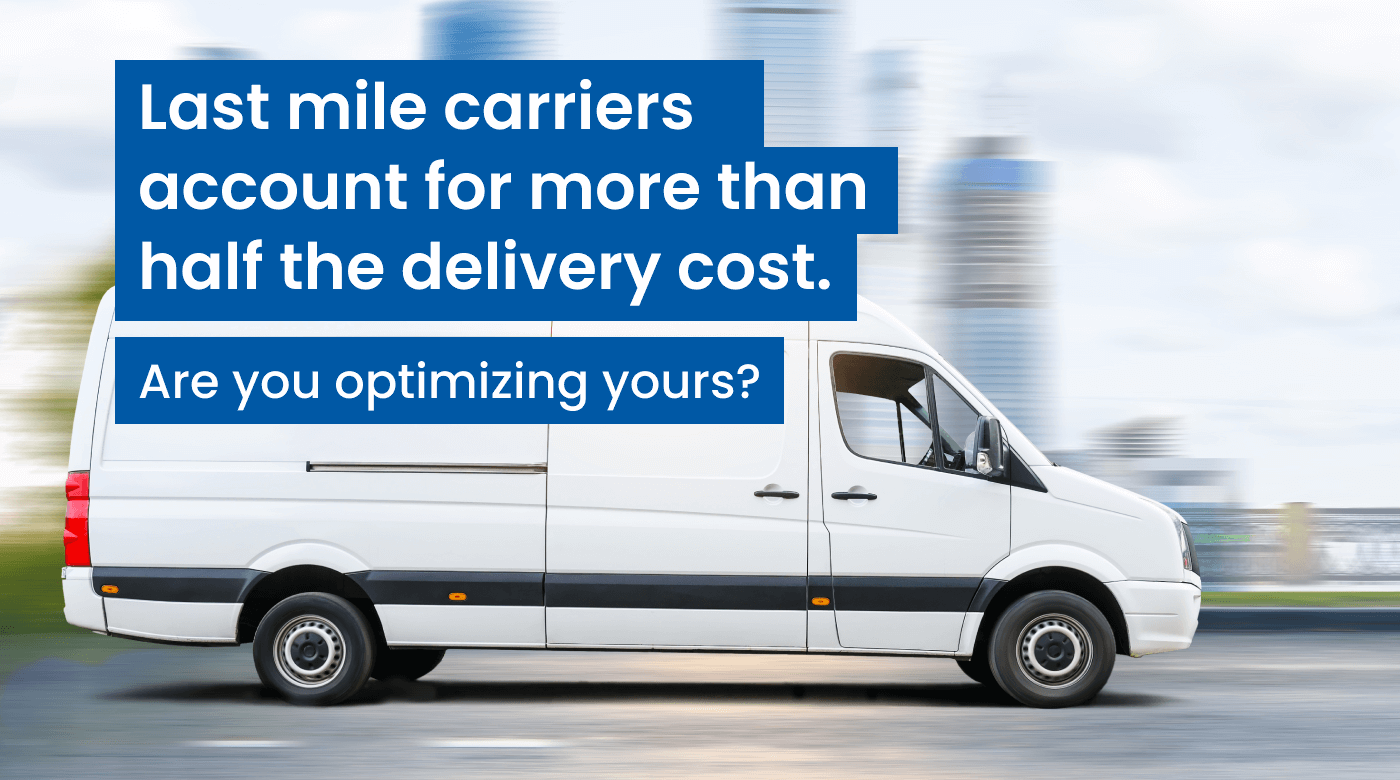It can be challenging to get your product into the hands of your customers.
Businesses are put to the test — especially around the holiday season — when orders skyrocket.
Despite having sophisticated supply chains that move products worldwide, the real test is getting the right product to the customer at the right time.
That’s where the last mile carrier comes into play.
In this post, we’ll cover everything you need to know about last mile carriers including why they are important and how you can select and implement one.
Before diving in, let’s define “last mile carrier” to ensure we’re on the same page.
What is a last mile carrier?
A last mile carrier is a courier taking the product from the hub to the final destination (often the end customer). This is the final leg of the package’s journey.
For example, if you ordered a pair of shoes, the raw materials might ship from overseas to a factory where the shoes are created. This would involve international freight and not a last mile carrier.
Once the product is assembled in the factory, it would be shipped to the retail store or directly to the customer’s house. This portion would involve a last mile carrier.
A delivery involving a last mile carrier is depicted in the visual below:
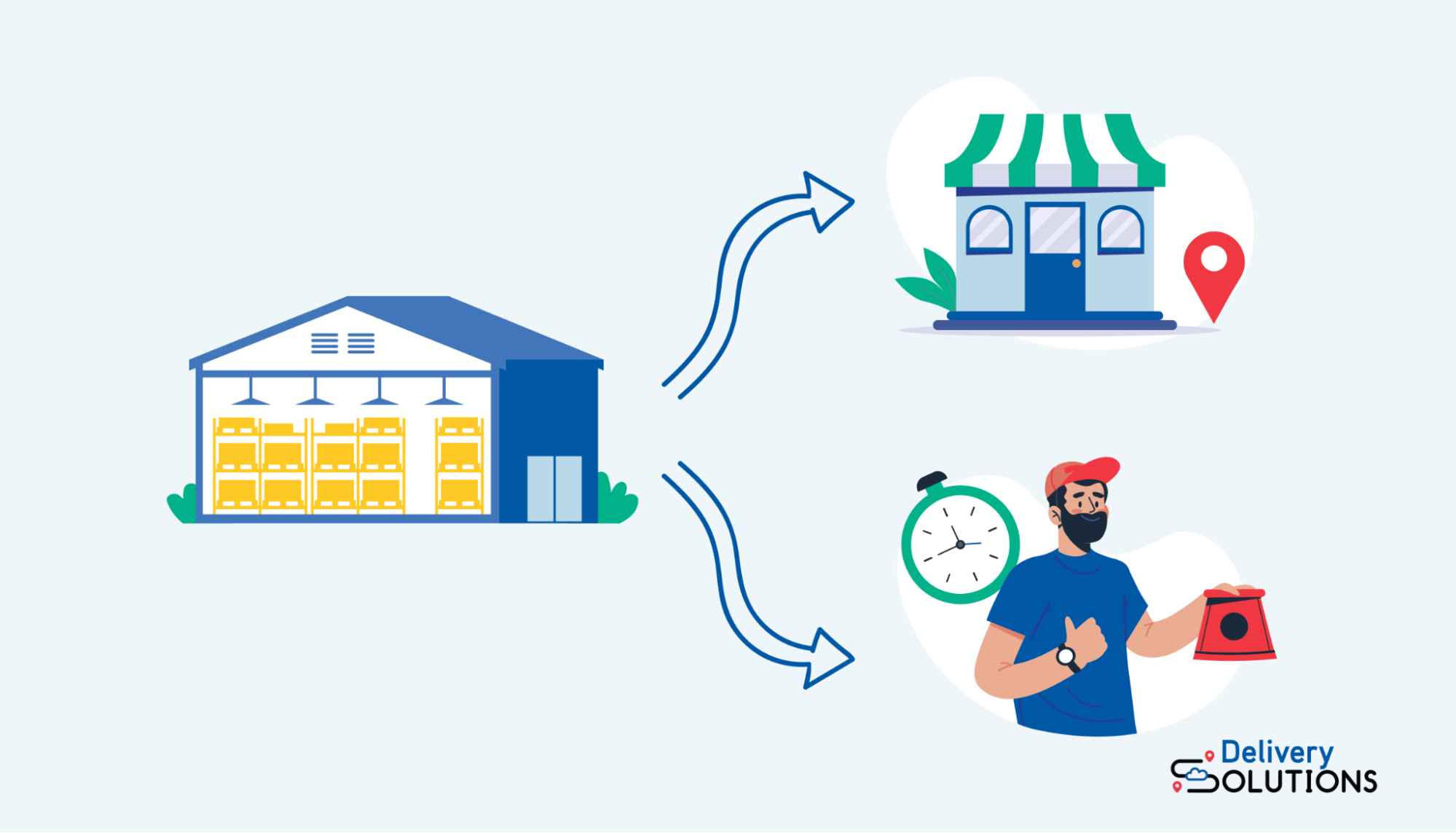
The last mile depends on how it gets into the customers’ hands. The customer could pick it up at a retail store or order online and get it delivered to their house.
Thus, the last mile carrier would be the courier who takes the products from the factory to the store or directly to the customer.
Delivery companies like UPS, FedEx, and USPS serve as last mile carriers for millions of businesses worldwide.
The logistics industry is complex, and last mile carriers are responsible for same-day deliveries, real-time tracking, meeting customer expectations, and so much more.
A lot can happen in the final mile of delivery, making the last mile carrier such an important stage of the delivery process.
It’s important to note that last mile carriers are expensive. It’s estimated that more than 53% of the total shipping cost is attributed to the last mile.
That’s why businesses are so concerned with picking the right one. Businesses must constantly optimize the last mile to reduce costs and ensure on-time deliveries.
Could a business operate without a last mile carrier? It would be tough. Let’s dive in to see why a last mile carrier is essential.
The importance of last mile carriers
Last mile carriers bridge the gap between the end consumer and their package.
The last mile carrier’s job might be one of the most important parts of the delivery process. Without them, nothing would be in place to transport the goods to the customers’ homes.
Since so much of the delivery cost is allotted to last mile carriers, it is in the business's best interest to scrutinize their practices and ensure they are optimized for efficiency.
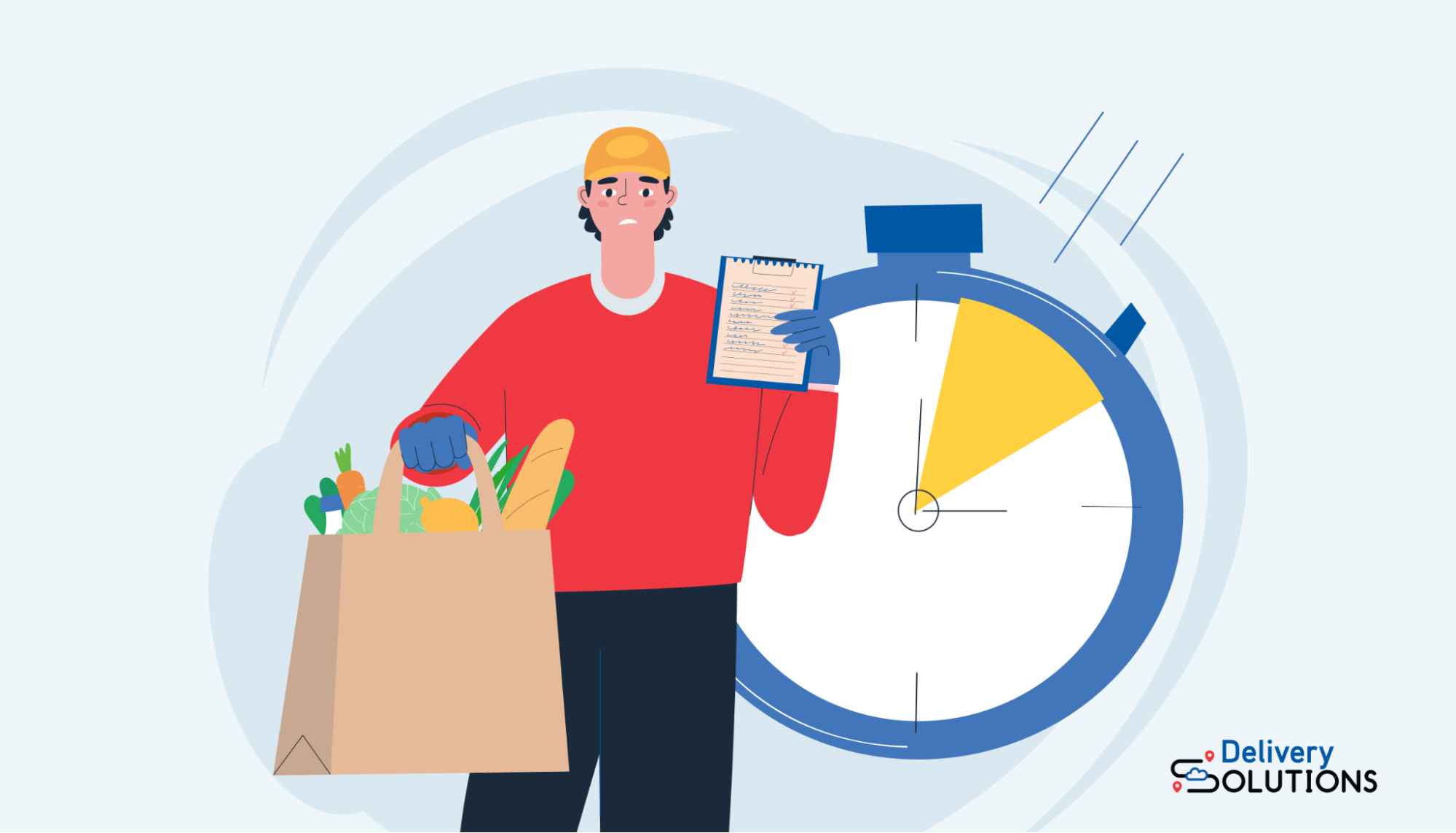
Last mile carriers are essential because they improve customer satisfaction, reduce operational costs, and provide near real-time visibility.
Improving customer satisfaction
Your customers will benefit the most if you select the right last mile carrier. Your customers will receive their orders on time with a reliable and efficient last mile carrier.
Your customers' positive experiences with your company (including the ordering and delivery process) will increase their satisfaction.
However, you should be warned. If the last mile carrier fails, it will be on you to make it up to your customers.
Late deliveries that don’t arrive on time will harm your brand. Make sure to find a reliable last mile carrier who can get the job done.
Reducing operational costs
A third-party last mile carrier already has the shipping process optimized.
Building and owning a fleet of delivery vehicles to deliver your products in the final mile likely is not a sound investment for your business.
That’s why so many companies rely on last mile carriers who already know exactly what to do.
Since they have the infrastructure to make national (and even international) deliveries, they can quickly optimize their fleets and provide you with a cost-effective service for the final mile.
Providing near real-time visibility
A delivery date no longer cuts it. Customers like to see where their packages are in near-real time.
Most last mile carriers provide the technological infrastructure for customers to see where their package is while it is being processed and shipped to them.
However, not all last mile carriers have this function fully operational and up-to-date.
As you select your last mile carrier, don’t just consider which one serves your target markets and is the most cost-efficient.
Examine each last mile carrier from the customers’ standpoint and see which will deliver for your business.
What are the types of last mile carriers?
There are many different types of last mile carriers for businesses all over the world.
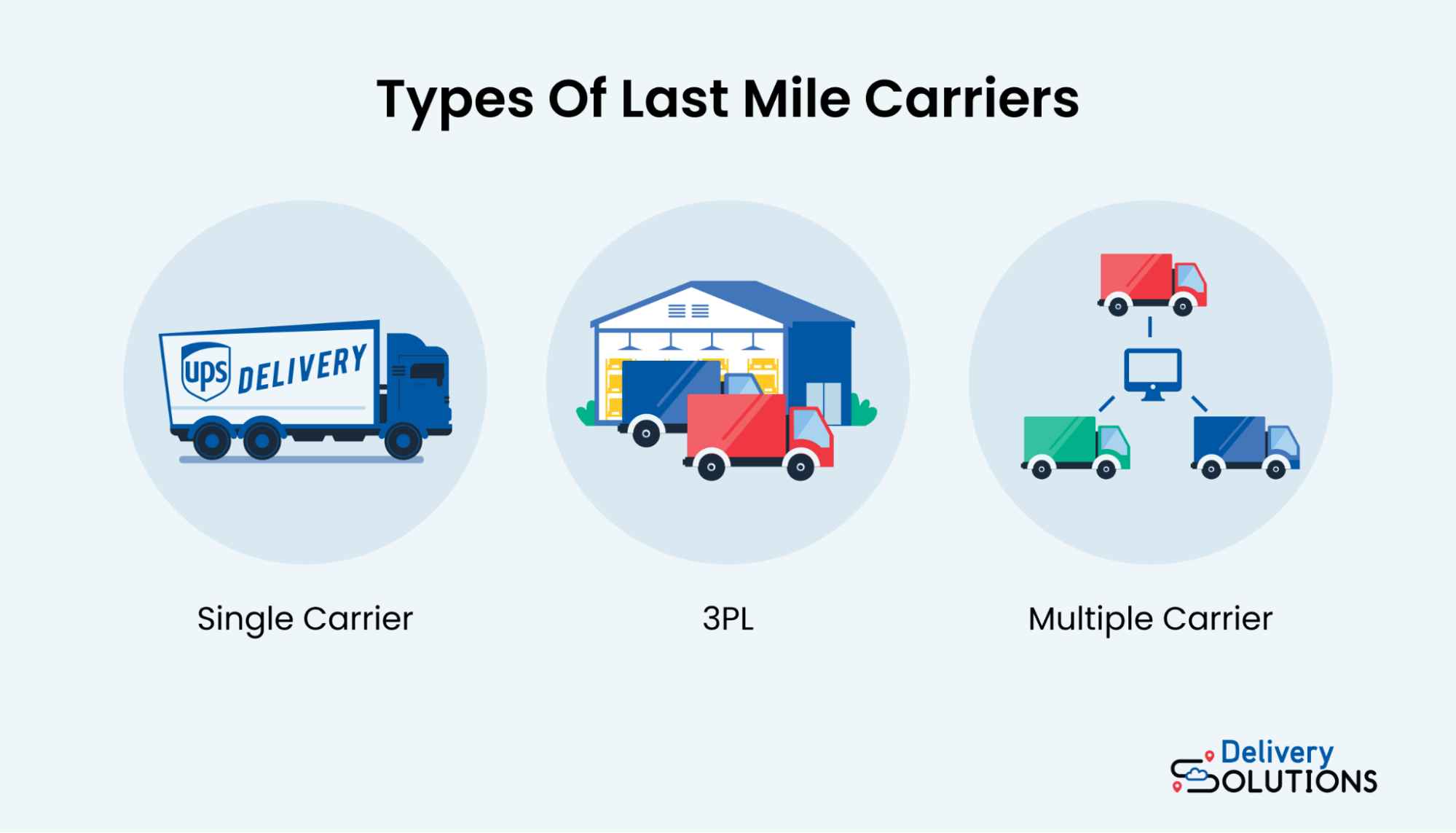
The most common types of last mile carriers include a single carrier, third-party logistics (3PL), and a combination of multiple carriers.
Single carrier
Some businesses operate with only a single carrier that leads fulfillment in the final mile.
These carriers are some of the most common delivery fleets that get packages to customers daily. They include FedEx, UPS, USPS, and more.
Although working with one single carrier might be preferred from a simplicity standpoint, you must ensure you can scale with that carrier as your business grows.
In addition, you should examine the carrier's historical pricing, delivery areas, and any past reliability issues. By only working with one carrier, you become heavily reliant on that carrier to deliver without disruptions.
Third-party logistics company (3PL)
A third-party logistics company (3PL) is an intermediary between the business and the shipping carriers.
The business hires the company to own the last mile delivery process. This includes finding and optimizing last mile carriers to operate as efficiently as possible.
Businesses that work with a 3PL benefit from having a company that understands the supply chain and delivery process take control of their own.
However, 3PLs can be an added expense for the business since they are a middleman that manages the delivery process on behalf of the operators.
Multiple carriers
Businesses that use multiple last mile carriers work with a combination of single carriers.
They don’t have exclusivity for one carrier and may, instead, optimize their shipments with different last mile carriers based on region, cost, or another variable.
However, working with multiple carriers can add complexity to delivery operations.
The easiest way to work with multiple carriers is if you have the technology to optimize them in real time. The Omnichannel Experience Management (OXM) Platform by Delivery Solutions orchestrates and optimizes last mile carriers, while giving businesses ready and instant access to multiple carriers without them requiring dedicated negotiated contracts with each carrier.
How can I optimize my last mile carrier?
Businesses often need a transportation management system to optimize their last mile carriers.
With Delivery Solutions, you can choose from multiple last mile carriers to ensure your customers’ packages arrive on time.
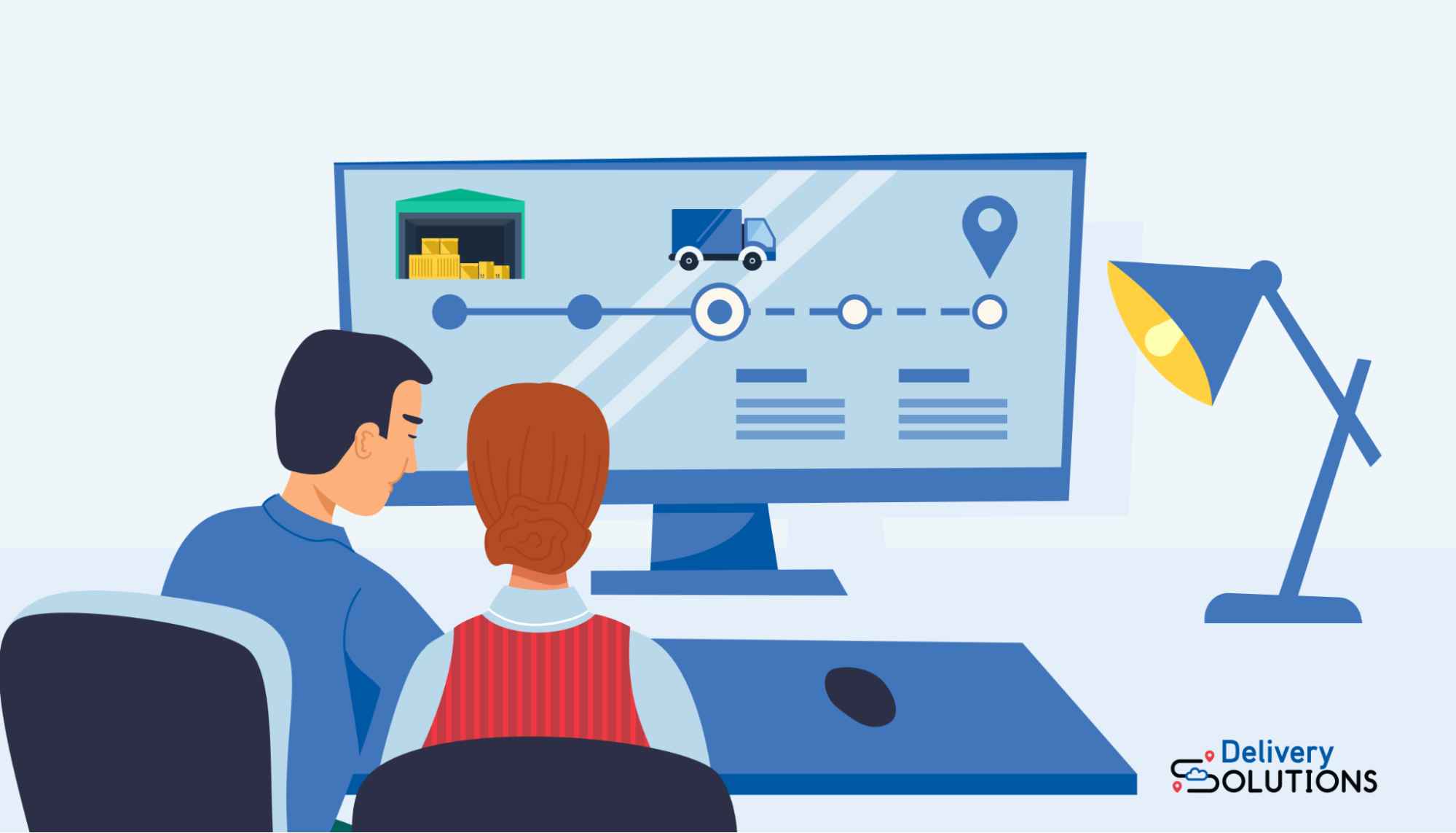
This enables your business to work with multiple last mile carriers instead of relying on one.
Delivery Solutions’ advanced technology provides businesses with the following:
- A robust network of delivery providers through a one-time integration
- Ease of adding new delivery providers
- Maintaining uniform shipping labels regardless of multiple carriers
- Rate shopping
- Orchestrating and tracking shipping providers
- More optionality and fewer delivery delays
- More transparency for order tracking and notifications
Businesses with the right software, like the one Delivery Solutions provides, can be more agile and respond to market changes quickly.
If one courier is grounded or experiences a workers’ strike, the business can quickly adapt and focus on getting its shipments out through a different courier.
That’s why businesses are taking the proper time to look holistically at their last mile delivery process from start to finish.
While it may make sense to work with a single provider, there are plenty of other options in the market that propel businesses forward and scale with them with ease.
Conclusion
A last mile carrier is an essential part of the entire business operation. It’s the courier that delivers the product to its final destination — often a customer or a storefront.
Businesses around the world are pushed to the limits to find a reliable last mile carrier that gets their products to their customers on time.
As businesses grow, so must the last mile carrier’s responsibility. Businesses must select the right partner to complete the delivery process. Failure to do so can dramatically impact the company’s brand perception.
Scale your omnichannel delivery strategy with Delivery Solutions. Our platform enhances the fulfillment experience for enterprise retailers by providing flexible optionality for consumers and priming merchants for innovation at scale.
Reach out today to get started.
Ryan Caldarone
Ryan is a Sr. Digital Marketing Manager with over ten years of experience in B2B eCommerce, specializing in brand storytelling and content. Having contributed to hundreds of creative projects for SMBs and startups across the tech, energy, and fine arts sectors, Ryan brings diverse perspectives.
